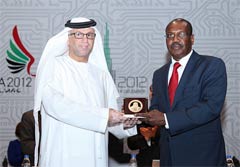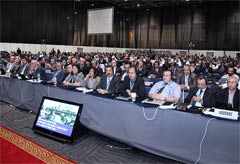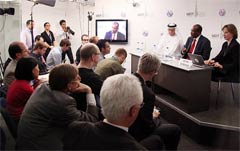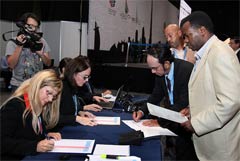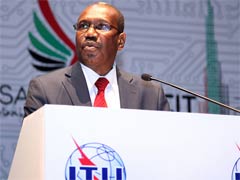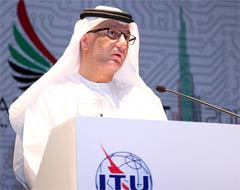


|
WCIT-12 News:
|
Conference concludes in Dubai with 89 countries having signed the updated International Telecommunication RegulationsThe World Conference on International Telecommunications (WCIT-12) ended on 14 December, having welcomed almost 1600 delegates from 151 Member States, including almost 70 ministers, deputy ministers and ambassadors. A total of 1275 proposals were submitted by Member States. “For the last two weeks, the United Arab Emirates (UAE) has been honoured to host and organize WCIT-12. It was our ambition to host this important conference in the UAE in order to discuss and develop the International Telecommunication Regulations (ITRs), which have not been debated since the Melbourne conference in 1988. And we in the UAE are accustomed to exerting the utmost efforts to attain our ambitions and make our dreams come true,” said Mohamed Al-Ghanim, Chairman of WCIT-12, in his closing statement. Some 89 Member States signed the updated treaty on 14 December. Speaking at the closing ceremony, ITU Secretary-General, Dr Hamadoun I. Touré, commented: “A clear majority of Member States has already signed the new treaty – and these countries represent not just most of the world’s people, but the great majority of the world’s unconnected people. We understand that some Member States need to go to their capitals and constituencies before they can accede to the new ITRs.” Dr Touré then went on to state: “The work here has been intense and I appreciate the efforts put in by each and every delegation. The days have been long, and the nights have been even longer. But the dawn has broken on a new day – and a new set of ITRs. And I do not think that we allowed challenges and controversies to divert us from our common goal, to bring the benefits of communications to the 700 million people who still don’t have mobile phone network coverage. And even more importantly to the 4.5 billion people who are not yet online.” In this context, the treaty calls upon Member States to “create an enabling environment for the implementation of regional telecommunication traffic exchange points, with a view to improving quality, increasing the connectivity and resilience of networks, fostering competition and reducing the costs of international telecommunication interconnections.” This final Issue of the WCIT-12 Highlights looks at the closing moments of the conference on 13 and 14 December. Human rights included in the treatyThe inclusion of human rights in the ITRs was the subject of many debates. Believing that technical treaties may have human rights implications, a number of countries supported inclusion, in the preambular part of the treaty, the clause “Member States affirm their commitment to implement these Regulations in a manner that respects and upholds their human rights obligations”. Others found this reference to human rights incomplete without an explicit mention of the right of access to international telecommunication services. They went on to request that the phrase "and recognize the right of access of all Member States to international telecommunication networks and services" be added after the word “obligations”. A long debate ensued. “We have made a number of interventions and we have worked closely with colleagues to try to find a way to express the importance of human rights obligations, and we have made considerable progress, as is reflected in the preamble text before us,” said one delegation. Another delegation added: “The proposals put forward for amending the text do not correspond to well-established human rights language. We believe that this conference should not draft new human rights language, but reaffirm our existing commitments. Human rights are for individuals, not for States. We regret that some Member States are trying to politicize the very important issue of human rights. Therefore, we cannot agree to the changes proposed.” Echoing a similar sentiment, another delegation said: “I need to reiterate that human rights are for individuals. The text respecting the rights of access of all Member States to telecommunication services appears to create new human rights language. I must say to the conference that this is not the forum to be creating new human rights language. And so while we recognize that all Member States are respecting their human rights obligations, with regret I cannot support this addition.” In the end, a decision was taken by vote to also include an explicit reference to the right of access of Member States to international telecommunication services. The full text of the preamble as approved is cited below: These Regulations recognize the right of access of Member States to international telecommunication services.”
Other major issuesSecurity and unsolicited bulk electronic communications were also hotly debated issues. The two provisions below helped break through the logjam on Articles 5A (Security and robustness of networks) and 5B (Unsolicited bulk electronic communications):
Security and robustness of networks (Article 5A)Under this Article, the following provision was approved after a lengthy discussion: “Member States shall individually and collectively endeavour to ensure the security and robustness of international telecommunication networks in order to achieve effective use thereof and avoidance of technical harm thereto, as well as the harmonious development of international telecommunication services offered to the public.” Unsolicited bulk electronic communications (Article 5 B)Some countries regretted that the word “spam” had been dropped from the initial proposal. Others queried the meaning of the word “unsolicited” and suggested new phrasing of the Article’s title. Many others stressed they could not accept the Article if the words used in it were not defined, as they might be outside the scope and purpose of the ITRs. They wanted it stating clearly that the ITRs do not address the content-related aspects of telecommunications. Their concerns led to the adoption of the following provision: Recognized operating agencies versus operating agencies… a solution at last!The issue of recognized operating agencies (ROAs) versus operating agencies (OAs) was also resolved and is covered under Article 1 dealing with the purpose and scope of the treaty. In this article, "authorized operating agencies" refer to those operating agencies, authorized or recognized by a Member State, to establish, operate and engage in international telecommunication services to the public. The two provisions below also serve to highlight the conclusions reached on what was a hotly debated issue:
International telecommunication service traffic termination and exchangeA new Resolution, adopted by the conference on Thursday night (13 December) says that the transition from dedicated phone and data networks to converged IP-based networks raises regulatory, technical and economic issues which need to be taken into consideration. It adds that many Member States have expressed a need to initiate and implement commercial agreements between authorized operating agencies and service providers of international services, with the objective of empowering all the participants in the new value chain. It notes that some Member States are observing deterioration in the quality of international services and voice traffic. It also notes that there is a need for broader understanding of alternative dispute resolution mechanisms arising out of commercial arrangements. Some Member States have concerns for the prevention and mitigation of fraud in international telecommunications, the Resolution also notes. A delicate compromiseEntitled “International telecommunication service traffic termination and exchange”, the new Resolution represents a delicate compromise of what were initially intended as provisions. They had been featured in Article 6 of the ITRs under the title “Other new provisions” (42Q to 42Y). For some countries, these provisions were too detailed to be included in a treaty of high-level principles. One country calling for deletion, argued that such provisions could cause market distortion. Another called on the conference to look at the bigger picture. Next stepsThe Resolution invites concerned Member States to collaborate so that each party in a negotiation or agreement related to or arising out of international connectivity matters can seek the support of relevant authorities of the other party’s State in alternative dispute resolution. The Resolution then goes on to instruct the Director of the Telecommunication Standardization Bureau to take necessary action in order that Study Group 3 of the ITU Telecommunication Standardization Sector ( ITU-T ) can study recent developments and practices with regard to the termination and exchange of international telecommunication traffic under commercial agreements. The aim would be to develop a Recommendation, if appropriate, and guidelines for concerned Member States, for the use of providers of international telecommunication services in regard to issues they consider relevant. Some examples here include conditions for the establishment of sending and payment of invoices, dispute resolution, fraud prevention and mitigation, and the conditions for charges for international telecommunication service traffic termination and exchange. Member States are invited to provide contributions on international telecommunication service termination and exchange to ITU-T Study Group 3 for the furtherance of its work. Sector Members are also invited to provide information to Study Group 3 and share best practices in the area of international telecommunication services, traffic termination and exchange, including in particular, invoicing. Achievements in briefThe newly updated treaty contains:
Referring to these and other achievements of the conference, Mr A-Ghanim said “Your reference to the right of persons with disabilities and those with special needs to enjoy access to information and enter the information society, and the desire of States and ITU for this right to be included in the ITRs, is proof of the noble mission carried out by ITU with your help and support. Furthermore, the special measures adopted to assist landlocked developing countries and small island developing states to gain access to international optical fibre networks will be of great help to these countries in strengthening their integrated development and their capacity to build their own information society.” Mr Al-Ghanim then commended regional groups for their preparatory work and cooperation throughout the conference: “We are highly indebted to the regional groups for the cooperation, generosity and flexibility they displayed and for the prominent part they played in arriving at consensus solutions, which were undoubtedly instrumental in enabling the conference to achieve the positive outcomes that were hoped for. I thank them for their spirit of cooperation and acceptance of other points of view, which was clearly evident during the coordination meetings between the regional groups.” Presenting the ITU Gold Medal to WCIT-12 Chairman, Mohamed Al-Ghanim, Dr Touré said that Mr Al-Ghanim had played a vital role in the work of the conference. “He has managed to keep his calm and nerve throughout the long days and nights we have spent together. He has recognized that WCIT-12 is the beginning of an important new dialogue – a new dialogue that will bring fresh conversations into the converged world we live in.” |
